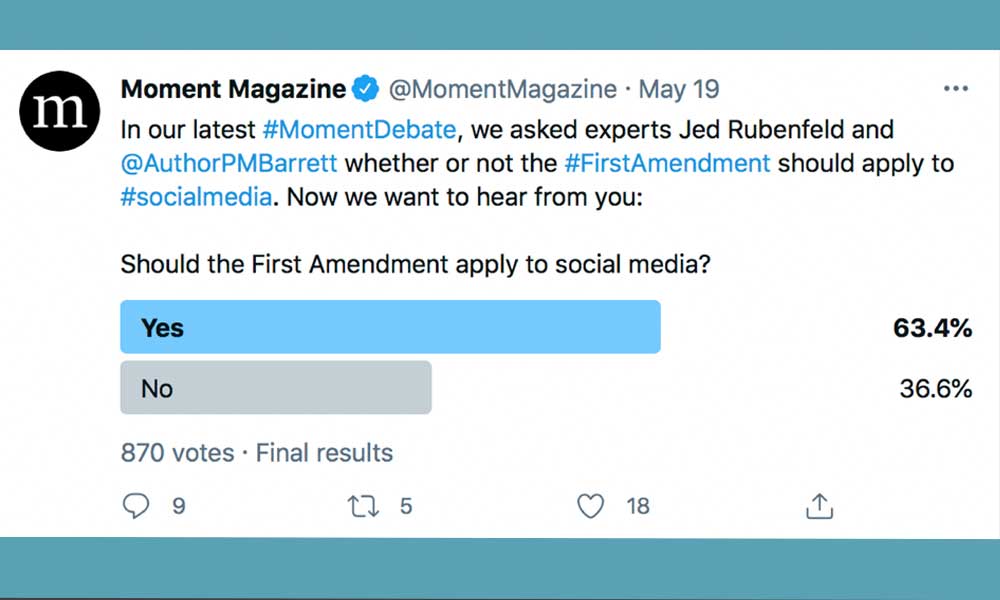In our previous debate, Moment asked if the First Amendment should apply to social media. Jed Rubenfeld, a constitutional scholar who has advised parties on possible litigation against Google and Facebook, said yes; Paul M. Barrett, deputy director of the NYU Stern Center for Business and Human Rights and coauthor of False Accusation: The Unfounded Claim That Social Media Companies Censor Conservatives, said no. Here, they respond to each other’s arguments. Read the original debate here
Jed Rubenfeld: Yes
Paul Barrett’s practical concerns about applying the First Amendment online are well-taken, but constitutional law demands this result in certain cases. Under well-established doctrine, it is state action when government officials induce, significantly encourage, coerce or jointly participate in a private party’s conduct. That’s exactly what’s happening today. Government is working with and pressuring the social media behemoths to block speech it disfavors, and that’s unconstitutional. As the Supreme Court has said, it is “axiomatic” that the government “may not induce, encourage or promote private persons to accomplish what it is constitutionally forbidden to accomplish.” I’m not arguing for new doctrine. I’m simply arguing for well-established principles to be applied.
Would social media be overrun with toxic content if the First Amendment were honored online? There’s a century of cases identifying speech the Constitution does not protect—for example, incitement, threats, obscenity and libel. But if we’re talking about speech the Constitution does protect, when did we become so afraid of the freedom of speech? The answer is not censorship. How about putting users in control instead? Give users an icon they can click on to opt into content moderation. That would honor both individual choice and the Constitution.
Jed Rubenfeld, a constitutional scholar, has advised parties on possible litigation against Google and Facebook.
Paul Barrett: No
Jed Rubenfeld makes a number of important points, including his warning about the danger of so much power over expression being exercised by a small number of Silicon Valley corporations. But his prescription of applying the First Amendment to Facebook and Twitter, as if they were arms of the government, strikes me as impractical in at least a couple of respects. First, how would we go about recategorizing these companies as government bodies? Would only Facebook, Twitter and YouTube be prohibited from moderating content on their platforms? What about Instagram and TikTok? Who is making these fateful decisions and based on what criteria? My second concern is what would happen on the platforms if most content moderation suddenly ceased. I’m pretty sure Facebook et al. would be overrun by toxic content that couldn’t be removed if the First Amendment applied: abusive hate speech, provably false misinformation of civic significance (such as lies about COVID-19 prevention and cures) and conspiracy theories that erode public trust in democratic institutions (such as free and fair elections and the peaceful transfer of power). Is that the social media we want? No. I would preserve the First Amendment’s explicit and long-honored application only to the government and possibly seek to diminish the scale and influence of the social media companies by means of other legal tools, including federal and state antitrust laws.
Paul M. Barrett is deputy director of the NYU Stern Center for Business and Human Rights and coauthor with J. Grant Sims of False Accusation: The Unfounded Claim That Social Media Companies Censor Conservatives.


